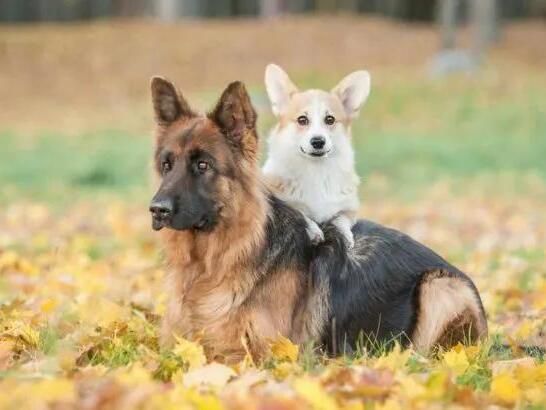German Shepherds are known for their loyalty and versatility, but how do they fare when paired with small dogs? These large canines possess strong herding instincts which can influence their interactions with smaller pets. In exploring whether German Shepherds make good companions for pint-sized pooches, we must consider their training, socialization, and the individual temperament of the dog. This article go into the dynamics between German Shepherds and small dogs, offering insights for owners looking to foster a peaceful coexistence.
Do German Shepherds Get Along With Other Dogs?
Yes, it varies whether a German Shepherd gets along with other dogs. It depends on several factors. These dogs are naturally somewhat dominant and may show aggressive tendencies towards dogs of the same-sex or those with a high prey drive. However, if socialized properly and frequently, they can be quite playful and enjoy the company of other dogs. A German Shepherd under 20 pounds might experience anxiety around larger dogs but can greatly benefit from having a companion dog with a compatible temperament.
Are German Shepherds Good With Other Dogs?
German Shepherds can indeed be good with other dogs if they are raised together. When German Shepherds and other dogs grow up together, they get along better, often getting into a strong bond as part of their pack. This association is beneficial for both, as they bring comfort to each other and help cure boredom without being too rough or aggressive.
While German Shepherds are known for being energetic and playful, they can easily tire out. However, having a buddy around shouldn’t be ruled out as German Shepherds often make great companions. Given their nature, it is difficult to generalize whether they are great or not great with other dogs; much depends on the individual dog’s personality and training.
Are German Shepherds Prone to Attacking Small Dogs?
Concerns about a German Shepherd dog chasing or attacking small dogs are often rooted in valid information about the breed’s tendencies. However, it’s crucial to assess each situation individually to draw clear conclusions. An intent to chase, stemming from a past incident, does not necessarily mean an attack is imminent. The risks often stem from the discrepancy in size between the dogs, but other factors and variables also role in how they react to one another.
Temperament
German Shepherds are known for their strong temperament which can vary widely due to individual variations and factors like socialization and training. While some German Shepherds from working lines have been selectively bred for working abilities such as herding, guarding, and police work, they can exhibit a high prey drive that prompts them to chase smaller animals. However, with proper training and a role in managing and channeling their energy in a positive, controlled manner, they can coexist peacefully with smaller dogs.
Socialization
In the socialization phase of German Shepherds, it’s a high priority to ensure that these large and powerful breeds are properly introduced to a variety of dogs. From my own experience with a German Shepherd, the best results occur when they are introduced to smaller, fluffy dogs during the early weeks of their life. Ideally, this window for puppies should open at a young age and continue throughout their life. When German Shepherds receive consistent socialization, they are likely to display non-aggressive behaviors toward other pets.
Training
In training a German Shepherd, it’s important that the dog responds to basic cues such as come, leave, and down. These skills are essential to prevent the dog from chasing smaller dogs. Ensuring your German Shepherd displays a fluent and reliable response in obedience allows the privilege of off-leash attendance in parks and public areas. As someone who has worked with numerous shepherds, I’ve seen firsthand how critical these foundations are for their safety and sociability.
History
German Shepherds were selectively bred for their herding skills, which consists of moving livestock like sheep from one area to another. Their herding style mainly consisted of tending, a type of boundary work where herders acted as live fences, keeping livestock within specific areas. This nature and tendency to chase small, fleeing animals was useful in past herding tasks but can manifest today as a behavior where they might chase small dogs. If allowed to repeatedly engage in this instinctive behavior, it becomes self-reinforcing, providing the dog with an adrenaline rush that makes future repetitions of the behavior more likely.
How to Stop a German Shepherd From Chasing/Attacking Small Dogs
On top of management, there are several techniques that can be taken to help prevent a German Shepherd dog from barking/attacking small dogs
Exercise and Mental Stimulation
German Shepherds are classified as herding dogs and are highly energetic. From the age of 8 months, a German Shepherd is entering the adolescent stage where keeping both their brain and body active is crucial. Many dog owners find this time to be challenging but manageable with the right training strategies. To avoid boredom, a common case in dogs that may result in undesirable behaviors, incorporating long walks as an option and engaging them in brain games like food puzzles provides necessary mental stimulation and enrichment.
Training
Training your German Shepherd to be responsive to cues helps in controlling and preventing problematic behaviors. Start by teaching basic commands such as recall, leave it, drop it, sit, stay, down, and attention. For walking in areas with distractions, like when walking near small dogs or prey animals, it’s useful to begin in areas free from distractions and gradually introduce them to more distracting settings.
Training tips include using a long line, leash, and harness to compromise between freedom and control, thus maintaining impulse and self-control, while increasing your dog’s frustration tolerance. Include advanced exercises such as heeling, lie on a mat, and ensure your dog with a high prey drive understands these commands to manage its instincts during walks.
Early Intervention
If you want to work on ensuring your German Shepherd gets along with other dogs, it’s best to start now while they are still young. The onset of social maturity in German Shepherds generally takes place between the ages of 18 to 24 months, a time when significant behavior changes, including changes in sociability levels, can impact how well they get along with other dogs. Starting early helps in molding a well-adjusted adult dog.
Behavior Modification
Depending on why a German Shepherd has chased a small dog, a different behavior intervention plan may be needed. For example, if the chasing is due to territorial tendencies, methods that focus on management and creating positive associations with other dogs found within the dog’s territory can benefit.
This general guide can help manage aggression effectively. Instead, if the issue is a lack of socialization leading to reactive behaviors directed at any dog regardless of proximity, training an alternate behavior to engage in is helpful. This approach involves a specific part of the brain and is considered more effective than traditional intervention tactics when triggered by prey drive.
Professional Help
Working with a professional is important in cases where German Shepherds, large and powerful dogs, require lots of guidance. It’s essential to find a dog trainer or behavior consultant with experience in managing prey-driven dogs. Ensure that they use gentle training and behavior modification techniques. Studies have found that punishment-based methods, such as yelling, alpha rolling, or forcibly removing objects from a dog’s mouth, can exacerbate aggression.
Conclusion
In conclusion, while German Shepherds are known for their strong herding instincts and energetic nature, with proper training, socialization, and behavior modification, they can coexist harmoniously with small dogs. Early intervention and consistent exercise and mental stimulation are crucial in managing their prey-driven behaviors and preventing aggression. Furthermore, enlisting the help of a professional who uses gentle training techniques is essential for ensuring the safety and well-being of both the German Shepherd and smaller dogs. By addressing these key areas, owners can foster a peaceful and enjoyable relationship between their German Shepherd and other pets.
FAQs
What breed of dog goes well with a German Shepherd?
When considering which dog breeds pair best with German shepherds, it’s essential to choose ones that can match their energy without being over-excited. Labradors and Golden Retrievers are known for their friendly demeanor, making them great companions for the sometimes aggressive German shepherd. Additionally, a Border Collie’s intelligent and energetic nature complements the German shepherd well, helping to avoid any issues related to hyperactivity or over excitement.
Are German Shepherds well behaved dogs?
German shepherd dogs are often considered very smart and easy to train, making them a favorite among families. When raised alongside children and other pets, they generally get along well with everyone, thanks to their protective yet gentle nature. However, they may be leary of strangers due to their guarding instincts. It’s crucial to avoid poorly bred individuals, as they can be high-strung and nervous.
Are German Shepherds friendly or aggressive?
German Shepherds are known for their intelligent and loyal temperament. While they can be naturally aggressive and protective, these traits are often balanced by their energetic and friendly nature. They enjoy the company of their family but may struggle with separation anxiety. Their instinct to protect makes them hesitant when meeting strangers.
Are male or female German Shepherds nicer?
In discussing whether male or female German shepherds are nicer, many dog owners note that while males can be more possessive, pushier, and bolder, they tend to be less aggressive than perceived. On the other hand, females, being naturally more maternal, are often seen as moodier and more reactive. This balance of traits can make the choice very personal depending on what qualities one prefers in a pet.


